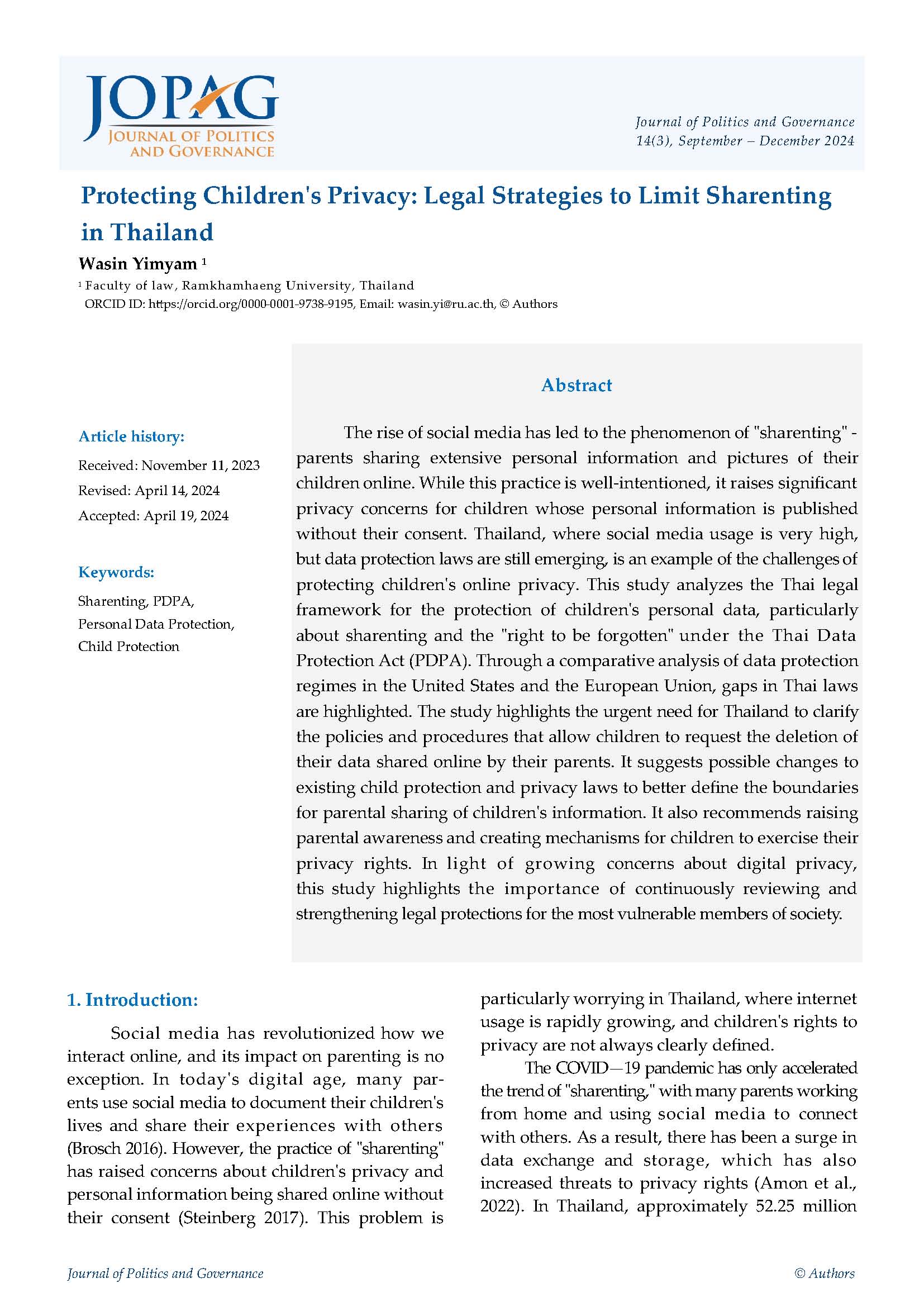Protecting Children's Privacy: Legal Strategies to Limit Sharenting in Thailand
Main Article Content
Abstract
The rise of social media has led to the phenomenon of "sharenting" - parents sharing extensive personal information and pictures of their children online. While this practice is well-intentioned, it raises significant privacy concerns for children whose personal information is published without their consent. Thailand, where social media usage is very high, but data protection laws are still emerging, is an example of the challenges of protecting children's online privacy. This study analyzes the Thai legal framework for the protection of children's personal data, particularly about sharenting and the "right to be forgotten" under the Thai Data Protection Act (PDPA). Through a comparative analysis of data protection regimes in the United States and the European Union, gaps in Thai laws are highlighted. The study highlights the urgent need for Thailand to clarify the policies and procedures that allow children to request the deletion of their data shared online by their parents. It suggests possible changes to existing child protection and privacy laws to better define the boundaries for parental sharing of children's information. It also recommends raising parental awareness and creating mechanisms for children to exercise their privacy rights. In light of growing concerns about digital privacy, this study highlights the importance of continuously reviewing and strengthening legal protections for the most vulnerable members of society.
Article Details

This work is licensed under a Creative Commons Attribution-NonCommercial-NoDerivatives 4.0 International License.
References
Altman, I. (1975). The environment and social behavior: Privacy, personal space, territory, and crowding. Brooks/Cole Publishing Company.
Amon, M. J., Kartvelishvili, N., Bertenthal, B. I., Hugenberg, K., & Kapadia, A. (2022). Sharenting and children's privacy in the United States: Parenting style, practices, and perspectives on sharing young children's photos on social media. Proceedings of the ACM on Human-Computer Interaction, 6(CSCW1), 1-30.
Anderson, M., & Jiang, J. (2018). Teens, social media & technology 2018. Pew Research Center, 31(2018), 1673-1689.
Bambauer, D. E. (2013). Privacy versus security. Journal of Criminal Law and Criminology, 103(3), 667-702. https://scholarlycommons.law.northwestern.edu/jclc/vol103/iss3/2
Barnes, R., & Potter, A. (2021). Sharenting and parents’ digital literacy: An agenda for future research. Communication Research and Practice, 7(1), 6-20. https://doi.org/10.1080/22041451.2020.1847819
Beauchamp, T. L., & Childress, J. F. (2001). Principles of biomedical ethics. Oxford University Press, USA.
Blum-Ross, A., & Livingstone, S. (2017). Sharenting: Parent blogging and the boundaries of the digital self. Popular Communication, 15(2), 110-125.
Bolson, A. P. (2016). Flawed but fixable: Section 230 of the Communications Decency Act. Rutgers Computer & Technology Law Journal, 42.
Brosch, A. (2016). When the child is born into the Internet: Sharenting as a growing trend among parents on Facebook. The New Educational Review, 43(1), 75-85. https://doi.org/10.15804/tner.2016.43.1.19
Brosch, A. (2018). Sharenting–Why do parents violate their children’s privacy? The New Educational Review, 54, 75-85. https://doi.org/10.15804/tner.2018.54.4.06
Chotchaisathit, R. (2014). Child protection in Thailand: Towards an improved system (Doctoral dissertation). Charles Sturt University. https://researchoutput.csu.edu.au/ws/portalfiles/portal/9311717/56563
Datareportal Digital. (2023). Digital 2023: Global overview report. https://datareportal.com/reports/digital-2023-thailand
De Miguel Asensio, P. A. (2020). Data protection in the internet: A European Union perspective. In Data protection in the internet (pp. 457-477). Springer.
Donovan, S. (2020). Sharenting: The forgotten children of the GDPR. Peace Human Rights Governance, 4(1), 35-59.
Dowdell, J. W. (2017). An American right to be forgotten. Tulsa Law Review, 52(3), 311-337.
Duggan, M., Lenhart, A., Lampe, C., & Ellison, N. B. (2015). Parents and social media. Pew Research Center: Internet, Science & Tech. https://policycommons.net/artifacts/618977/parents-and-social-media/1600051/
Eiamchamroonlarp, P. (2019). Right to be forgotten under the Personal Data Protection Act B.E. 2562. Thammasat Law Journal, 3, 704-736.
Fazlioglu, M. (2021). The United States and the EU’s general data protection regulation. In Data protection around the world (pp. 231-248). TMC Asser Press.
Gajda, A. (2018). Privacy, press, and the right to be forgotten in the United States. Washington Law Review, 93, 201-264.
Goldman, E. (2007). Search engines defeat “must-carry” lawsuit–Langdon v. Google. Technology & Marketing Law Blog. http://blog.ericgoldman.org/archives/2007/02/search_engines_3.htm/
Greenleaf, G., & Suriyawongkul, A. (2019). Thailand–Asia’s strong new data protection law. International Report, 161.
Haley, K. (2020). Sharenting and the (potential) right to be forgotten. Indiana Law Journal, 95(3), 1005-1020.
Hirsch, D. (2010). The law and policy of online privacy: Regulation, self-regulation, or co-regulation. Seattle University Law Review, 34(2), 439-461.
Keith, B. E., & Steinberg, S. (2017). Parental sharing on the internet: Child privacy in the age of social media and the pediatrician’s role. JAMA Pediatrics, 171(5), 413-414.
Langkarpint, K. (2023). Problems of the protection and enforcing the rights to be forgotten with the Personal Data Protection Act 2562 B.E. in Thai universities. The Journal of Law, Public Administration and Social Science, 7(1), 1-24.
Livingstone, S., & Smith, P. K. (2014). Annual research review: Harms experienced by child users of online and mobile technologies: The nature, prevalence and management of sexual and aggressive risks in the digital age. Journal of Child Psychology and Psychiatry, 55(6), 635-654. https://doi.org/10.1111/jcpp.12197
Napatanapong, C., & Ariyasunthorn, A. (2023). Protecting children on social media. Bangkok Post. https://www.bangkokpost.com/opinion/opinion/2433342/protecting-children-on-social-media
Nimnoo, N. (2019). The legal measures to protect the rights to personal data protection (Doctoral dissertation). National Institute of Development Administration (NIDA).
Schwartz, P. M., & Solove, D. J. (2014). Reconciling personal information in the United States and European Union. California Law Review, 102(4), 877-916.
Siibak, A., & Traks, K. (2019). The dark sides of sharenting. Catalan Journal of Communication & Cultural Studies, 11(1), 115-121.
Solove, D. J. (2010). Understanding privacy. Harvard University Press.
Solove, D. J. (2021). The myth of the privacy paradox. Georgetown Washington Law Review, 89(1). https://scholarship.law.gwu.edu/cgi/viewcontent.cgi?article=2738&context=faculty_publications
Srihatai, N. (2019). Use of an injunction to order access providers to disable access to copyright infringing materials (Doctoral dissertation). National Institute of Development Administration (NIDA).
Steinberg, S. B. (2017). Sharenting: Children's privacy in the age of social media. Emory Law Journal, 66, 839-884. https://scholarlycommons.law.emory.edu/elj/vol66/iss4/2


